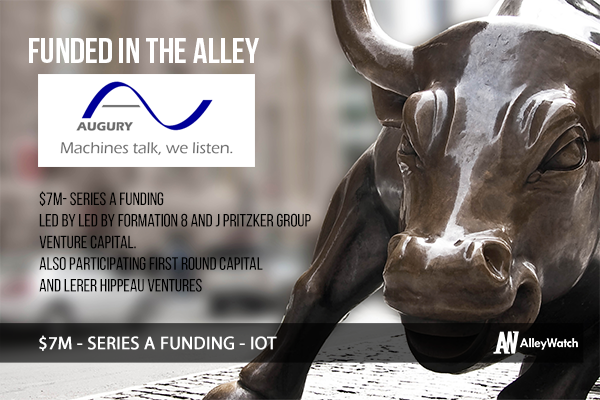An under-rated expensive industry in the machine diagnostic world is the predictive maintenance market. Overpriced machines that are too complicated are still being produced and finally the company Augury is doing something about it. With their mobile extension they can listen to machines better than ever and for a much cheaper cost .
With a fresh injection capital in the bank, CEO and cofounder Saar Yoskovitz, CEO sheds some light on the business, where it is, and where its going.
Who were your investors and how much did you raise?
Our latest investment round was a $7 million Series A funding round led by Formation 8 and joined by Pritzker Group Venture Capital. Existing investors First Round Capital and Lerer Hippeau Ventures have also participated in the funding.
Tell us about your product or service.
Augury is like the “Shazam” for machines. It is redefining the predictive maintenance market, one that has remained inaccessible and expensive for decades. Augury is bringing its proprietary algorithms, smart sensing device and mobile diagnostics tool to new markets, starting with diagnosing HVAC (heating, ventilation and air conditioning) systems within commercial buildings. The company’s technology has the potential to save billions of dollars in maintenance and energy costs. In doing so, Augury is helping to create a much larger market for predictive maintenance and will eventually expand its reach to diagnosing the IoT (Internet of Things).
What market you are targeting and how big is it?
According to a recent McKinsey report about the coming potential of the Industrial IOT, the realm of predictive maintenance in factories could be the largest sector of growth, with $1.2 to $3.7B in value by 2025.
How is your product disrupting the market?
The biggest factor preventing companies from adopting predictive maintenance is cost. Augury fixes that problem. It uses your smartphone and a device called the “Auguscope” to replace what would otherwise be $40,000 in equipment for a fraction of the cost.

30hat was the funding process like?
We prepared for the fundraising process like we’re going to battle, and fortunately the preparation was worth it. The process starts off with research by looking at the VC’s, their partners and their recent investments. Follow this up by reaching out to companies that qualified VC’s have invested in to see how they handle and treat their investments. Finally, work on your pitch. Pitch your company to mentors, past business partners, advisors, etc. None of the research matters if you don’t lock down your pitch.
What are the biggest challenges that you faced while raising capital?
It’s very specific to Augury, but we have a hardware product selling to enterprise customers in an unsexy market. Those are the top challenges. Primarily, the biggest challenge was the non-traditional market for VCs – we had to help them understand the market and the opportunity. Selling to enterprises means that landing one huge partner sounds less impressive than having 10,000 monthly active users on a website or mobile app, but the reality is much different – one customer holds a lot of upside potential. And hardware is always hard.
What factors about your business led your investors to write the check?
First, we put a lot of hard work and preparation into finding the right VCs who were ready to invest in our market. Second, we built a technology platform (both hardware and software) that is relevant today and will only become more so in the future as IoT becomes more prevalent. In other words, we have a huge future potential, and we’re going all the way.
What are the milestones you plan to achieve in the next six months?
Augury will continue to lock in key partnerships, talk with venture partners, build out sales and marketing and grow the Augury team in the U.S. and in Israel.
What advice can you offer companies in New York that do not have a fresh injection of capital in the bank?
One thing every startup needs to learn is how to run lean. Augury went for over two years without investment as we perfected our technology and our business model. Don’t be afraid to make the tough cuts to keep your doors open and your dream alive. Being an entrepreneur is all about risk management. Sacrifice today by running lean so that you can be around tomorrow to watch your dream grow into a real company.
Where do you see the company going now over the near term?
Continued partnerships with Fortune 100 companies, deploying a continuous monitoring platform, and setting the stage to become the leader in the commercial HVAC predictive maintenance market.
Where is your favorite place to enjoy the summer weather in the area?
Paradox Lake – upstate NY. No internet or phone calls. It is the perfect escape.




